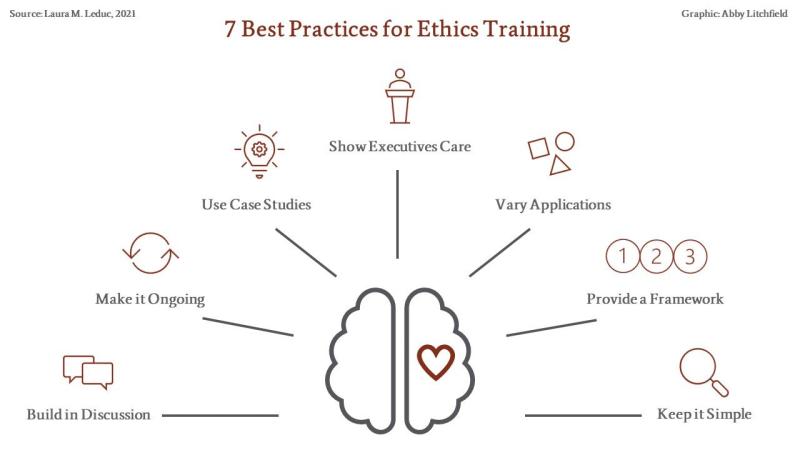What is ethical training?
Ethical training refers to a structured educational process designed to instill ethical principles, values, and behaviors within individuals or organizations. The primary purpose of ethical training is to cultivate a strong ethical culture, foster moral decision-making, and promote responsible conduct in various settings, such as the workplace, academic institutions, or professional organizations.
Key aspects of ethical training include:
Education on Ethical Principles:
- Ethical training provides participants with a clear understanding of fundamental ethical principles, such as honesty, integrity, accountability, and respect for others. It involves teaching individuals the importance of ethical behavior in personal and professional contexts.
Application of Ethical Standards:
- The training emphasizes the application of ethical standards to real-life situations. Participants are encouraged to analyze ethical dilemmas, make ethical decisions, and understand the consequences of their choices.
Legal and Regulatory Compliance:
- Ethical training often includes information about legal and regulatory requirements relevant to specific industries or professions. This ensures that participants are aware of the legal framework within which ethical decisions must be made.
Promotion of Ethical Culture:
- Ethical training contributes to the development of a positive and ethical organizational culture. It encourages open communication, transparency, and a commitment to ethical behavior among all members of an organization.
Case Studies and Scenarios:
- Practical case studies and scenarios are often used in ethical training to illustrate complex ethical issues. Participants engage in discussions, analyze scenarios, and explore different perspectives to enhance their ethical decision-making skills.
Conflict Resolution and Communication:
- Ethical training addresses conflict resolution strategies and effective communication in ethical matters. Participants learn how to navigate disagreements, express concerns, and seek resolution in a manner that upholds ethical principles.
Decision-Making Models:
- Ethical training may introduce decision-making models that guide individuals through a systematic process when faced with ethical challenges. These models often include steps such as identifying the issue, considering alternatives, and assessing the impact of decisions.
Leadership and Role Modeling:
- For leaders and managers, ethical training includes guidance on how to effectively lead by example and model ethical behavior. It explores the role of leadership in setting ethical expectations and creating a positive ethical climate.
Continuous Learning and Updates:
- Ethical training is an ongoing process that evolves with changes in laws, regulations, and societal expectations. Participants are encouraged to engage in continuous learning and stay informed about ethical best practices.
Measurement of Ethical Performance:
- Ethical training programs may include mechanisms to assess and measure ethical performance within organizations. This could involve surveys, evaluations, or other feedback mechanisms to gauge the effectiveness of the training.
Ethical training is applicable across various sectors and is especially relevant in professions where individuals have significant responsibilities, influence, or decision-making authority. By investing in ethical training, organizations aim to create a culture where ethical considerations are integral to decision-making processes and where individuals are empowered to act ethically in their professional and personal lives.
How is ethical training typically conducted or structured?
The structure and approach of ethical training can vary depending on the context, target audience, and desired outcomes. However, some common elements are often present:
Content and Topics:
- Foundational concepts: Training often begins with defining ethics, exploring core ethical principles (e.g., autonomy, beneficence, non-maleficence, and justice), and discussing various ethical frameworks and decision-making models.
- Scenario-based learning: Participants explore and analyze real-world situations or hypothetical cases that raise ethical dilemmas. This promotes critical thinking, communication, and ethical reasoning skills.
- Application to specific sectors or roles: Training may focus on ethical challenges specific to certain professions or industries, such as business ethics, medical ethics, or engineering ethics.
- Legal and regulatory considerations: Participants become aware of relevant laws, regulations, and codes of conduct that apply to their field and guide ethical behavior.
Training Formats and Activities:
- Interactive workshops and discussions: Encourage active participation, sharing perspectives, and applying ethical principles to concrete scenarios.
- Simulation exercises and role-playing: Allow participants to experience ethical dilemmas firsthand and practice navigating them in a safe and controlled environment.
- Case studies and problem-solving activities: Analyze real-world case studies and work together to identify ethical issues and develop potential solutions.
- E-learning modules and online resources: Provide flexible learning options and access to additional information and resources.
Additional Considerations:
- Tailoring to audience: Effective training is adapted to the knowledge, background, and challenges faced by the specific audience.
- Facilitation and expertise: Qualified instructors with experience in ethics and adult learning can guide discussions, provide feedback, and answer questions.
- Ongoing learning and reinforcement: Ethical training should be seen as a continuous process, not a one-time event. Organizations can encourage ongoing reflection and ethical decision-making through follow-up resources, coaching, and reminders.
Examples of Ethical Training Structures:
- Short workshops or seminars: These intensive sessions can provide a brief overview of ethics and key concepts in a compressed timeframe.
- Multi-session programs: These more comprehensive programs delve deeper into various ethical topics and allow for more interactive learning and practice.
- Blended learning: Programs combining online modules with in-person workshops or discussions can offer flexibility and personalized learning experiences.
Ultimately, the most effective ethical training is the one that engages participants, provides practical tools and frameworks, and encourages consistent application of ethical principles in everyday decision-making.
I hope this overview gives you a better understanding of how ethical training is typically conducted. If you have any further questions or want to explore specific aspects in more detail, please feel free to ask!













